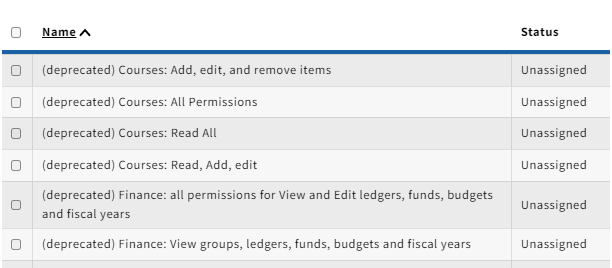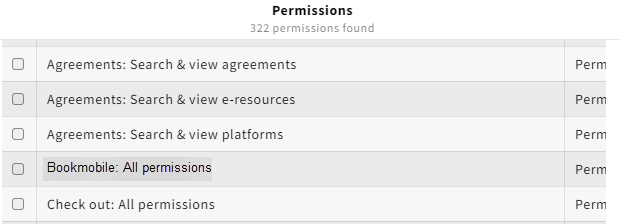Example of how this process works
Suppose Zhang San is a library developer who creates a new app to manage their library's bookmobile service. They call the app Bookmobile.
In version 1.0 of the app, they just have one permission set to manage all access in the user interface to the bookmobile app. That permission is named ui-bookmobile.all. In the UI, the permission has the name Bookmobile: All Permissions. It might look something like this:
As San continues development and prepares Bookmobile version 2.0, they decide to break down the "all" permission set into smaller chunks that better reflect how the app is used.
In order to make sure libraries don't accidentally give more permissions than they want to to app users, San decides to remove ui-bookmobile.all, and makes that change in the module code.
When San's hosting provider starts to upgrade Bookmobile from version 1.0 to 2.0, they run a review process with the mod-permissions module. During that process, the IT administrator uses a FOLIO module called mod-permissions, with a FOLIO interface called tenantPermissions, to examine the permissions of version 1 and version 2 and determine what has changed.
So, in this example, the tenantPermissions process would review the Bookmobile app and say hey, ui-bookmobile.all is in version 1.0 of this app, but it's not in version 2.0. It's been deprecated.
tenantPermissions than does a few things to the definition of ui-bookmobile.all that is still present on San's instance of FOLIO.
- it adds an attribute to the permission definition called "inactive", and marks it as true
- it changes the name of the permission in the user interface by adding (deprecated) before the permission display name.
- it leaves this version of the permission installed on San's instance of FOLIO
In the UI, after the upgrade, it will look something like this:
The (deprecated) part of the name in the FOLIO UI is what will clue in FOLIO administrators to know that hey, this permission shouldn't be used anymore.
After the upgrade, the staff at San's library log into FOLIO and see that this permission set has deprecated in front of the name. That prompts them to go review users who have that permission assigned to them, review other Bookmobile permissions, and make changes so that the deprecated permissions can eventually be completely removed.


